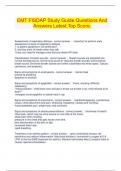Exam (elaborations)
EMT FISDAP Study Guide Questions And Answers Latest Top Score.
- Course
- Institution
EMT FISDAP Study Guide Questions And Answers Latest Top Score. Assessment of respiratory distress - correct answer. -important to perform early assessment of level of respiratory distress 1. is patient speaking in full sentences? 2. are they short of breath when they talk -if yes, yo...
[Show more]



